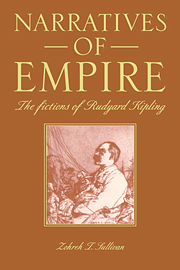3 - The problem of otherness: a hundred sorrows
Published online by Cambridge University Press: 18 September 2009
Summary
When Kipling returned to India in October 1882, he was not yet seventeen years old. Allan Octavian Hume (then fifty-three) had just begun a temporary retirement at Simla, Lord Ripon was the Viceroy appointed by the Liberal Prime Minister Gladstone, and the Ilbert Bill (1883), which allowed native judges to preside over European subjects, had not yet scandalized Anglo-India. A year later, when the Civil and Military Gazette's editorial seemed to support the Ilbert Bill, the members of the Punjab Club hissed at the bewildered young Rudyard as he entered the club dining halls (Birkenhead 1978: 79; Wilson 1979: 107). Kipling, however, was not then nor was he later a public supporter of “liberal” reforms in India. Alternately exhilarated and frustrated, divided between allegiances to home, work, and nighttime Lahore, Kipling spent the next seven years as reporter and writer first for the Civil and Military Gazette in Lahore and later for the Pioneer in Allahabad. He used the fortress of his family, cherished and idealized as his “Foursquare,” as a retreat from the turbulent outside world where “parboiled,” fevered and sleepless he worked over sweat-drenched typewriters. But his nightly insomnia also produced fertile wanderings through the alleys of Lahore that in turn provoked his earliest stories told by narrators who had access to both Indian worlds.
His nighttown narrators appropriated stories of the Other, and sometimes the voice of the Other – a strategy that necessarily reminds us of the larger appropriations of European imperialism – but with a difference.
- Type
- Chapter
- Information
- Narratives of EmpireThe Fictions of Rudyard Kipling, pp. 48 - 77Publisher: Cambridge University PressPrint publication year: 1993



